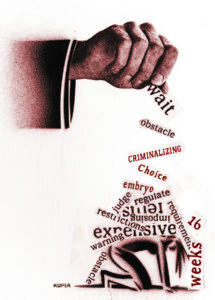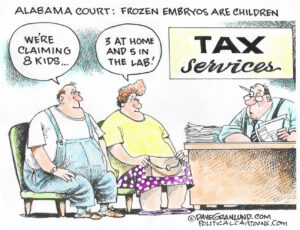Trump Wants You to Be Afraid of Socialism
The president is engaging in fearmongering over visions of the U.S. turning into Venezuela under a Democratic administration. Manuel Balce Ceneta / AP
Manuel Balce Ceneta / AP
President Donald Trump and the Republican Party are reviving the Red Scare as a central tactic of his 2020 campaign to retain the White House. In Trump’s view, a socialist system is synonymous with poverty and despair, government coercion, domination and control. It is antithetical to liberty and independence. This approach might seem curious, given that interest in socialist ideas is at an-all time high in the United States, as ordinary people react to an out-of-control capitalist system designed to enrich the rich. Trump and his party are betting that good, old-fashioned American individualism will overcome any desire for greater collectivism and more government-funded social programs.
If there is any doubt that this is guiding his path to reelection, Trump’s President’s Day speech on Venezuela is Exhibit A. During his roughly 30-minute address, Trump used the words “socialism,” “socialist,” “communism” or “communist” 36 times—roughly 1.2 times per minute. He echoed simplistic platitudes in an attempt to associate socialism with tyranny (“Socialism is about one thing only: power for the ruling class”). Trump first uttered the words, “Tonight, we renew our resolve that America will never be a socialist country” during his Feb. 5 State of the Union address, receiving wild applause—from both sides of the aisle. He repeated a version of that phrase on Monday:
[T]o those who would try to impose socialism on the United States, we again deliver a very simple message: America will never be a socialist country.
An earlier instance of the Trump White House exploring this strategy can be traced to a document published Oct. 23, 2018, by the White House Council of Economic Advisers, titled, “The Opportunity Costs of Socialism.” The document anxiously refers to how “[d]etailed policy proposals from self-declared socialists are gaining support in Congress and among much of the electorate.” It points out that “[i]n a socialist system, the state decides the amount to be spent, how it is spent, and when and where the services are received by the consumer,” failing to mention that major monopolistic corporations often make such decisions for us in the current system.
The Republican Party has jumped on the anti-socialist bandwagon, fixating mostly on what it says are the enormous costs of progressive government programs (somehow never raising such questions about the bloated military budget), but also expressing horror at how “[f]or the first time in a lifetime, a wave of Democratic candidates are proudly calling themselves socialists.”
I have to admit it is a brilliant strategy. First, in conflating “socialism” with Venezuela, Trump makes the case that the U.S. is justified in rescuing Venezuelans from their government—fulfilling one of his latest foreign policy priorities. Second, demonizing “socialism” enables him and his party to denigrate the new, more progressive members of the Democratic Party who identify as democratic socialists. The GOP’s tactic is aimed at deepening an existing divide within the Democratic Party, which has long claimed progressive ideals but only recently begun to espouse them, thanks to the leadership of such self-described democratic socialists as Alexandria Ocasio-Cortez and Rashida Tlaib. And finally, by denouncing socialism, Trump and the GOP also undermine the socialist-style progressive policy proposals—such as Medicare-for-all and the Green New Deal—that have gained steam in Congress and among the public.
There is a rich history of “the socialist” as a quintessentially American boogeyman. Irrational fears of socialists, communists, anarchists and pro-Soviet infiltrators overrunning the country destroyed many lives and careers in the 1920s and ’40s. There has never truly been a reconciliation or atonement for the two Red Scares, as they were called. Trump seems to be ushering in a third wave of anti-communist hysteria, to his political benefit. In fact, a newspaper editor in Alabama recently called for the Ku Klux Klan to engage in mass lynchings of Democrats because of the “socialist-communist ideology” prompting Democrats “to raise taxes in Alabama.”
This strategy puts left-leaning Democrats into the position of having to pick sides. Presidential hopefuls Kamala Harris and Beto O’Rourke have both asserted their allegiance to capitalism in recent days. Elizabeth Warren—widely seen as the best leftist alternative to Bernie Sanders, famously said a year ago, “I am a capitalist to my bones.” If the only politicians proudly claiming to be socialists are a handful of stalwarts like Sanders, Ocasio-Cortez and Tlaib, their most-favored policy proposals can be more effectively demolished in the political realm.
What none of the detractors of socialism (including those who claim to be leftist capitalists) likes to draw attention to is the fact that we already have a partially socialist country. Such programs as Social Security and Medicare, as well as our public schools, parks and libraries, are all products of a socialist style of government. The issue is not—as Trump likes to put it—whether we will become a socialist country, but how socialist can or should we be? We accept that elderly Americans—but not all Americans—deserve Medicare. The question of “why?” is always met with an answer involving affordability, never morality.
When pointing to examples like Cuba and Venezuela, critics of socialism hate to admit that U.S. policies aimed at isolating those nations have crippled their economies. There is less compelling evidence of the “evils” of socialism in such countries as Denmark, Norway, Sweden and other Scandinavian nations; free-market fundamentalist outlets like The Heritage Foundation engage in mental gymnastics to claim that those nations are not truly socialist. Or if they are, it is because they are first and foremost capitalist, or because their people want a socialist government—but Americans do not.
It is possible that Americans will fall for the Trump-GOP trick of using socialism as a political tool. As Trump has successfully demonstrated, if you repeat a lie often enough, to enough people, it begins sounding like the truth. Just as he has conned millions of his supporters into believing there is some sort of violent crime wave washing over our borders with Mexico, or that he is the focus of a “witch hunt” by the special counsel investigators, he can and will convince a significant faction of Americans that socialism is evil and that the U.S. could turn into Venezuela if a Democrat wins the White House in 2020.
But unlike the relatively abstract problems of immigrant crime and federal investigations, Americans know intimately the failures of our current economic system, as measured by their personal bank accounts and pocketbooks. Socialism does not cause medical bankruptcies, burdensome college debt, high housing costs, stagnant wages or any of those markers of economic insecurity and struggle we know all too well. Our current capitalist system does. Perhaps when Trump supporters and Republican voters see this year’s tax returns, they will understand just how their politicians conned them into thinking that the 2017 landmark “tax reform” law was yet another rigging of the economy to benefit the rich.
The most effective way to tackle Trump’s propaganda effort to deploy “socialism” as a dirty word is to counter with how capitalism has failed. Rather than defend the current system staunchly, as House Speaker Nancy Pelosi does (“We’re capitalists, and that’s just the way it is”), or demand tweaks to a failed system, as Warren does, it is time to hammer home how bad the system is and demand much more from government.
After all, Americans overwhelmingly favor higher taxes on the rich. If implemented, such taxes could fund a Medicare-style health program for all Americans, or better public schools, broader welfare programs or a government green jobs program. It doesn’t matter what you called such a trend—socialist, democratic socialism or a social democracy. The fact is that unfettered capitalism is antithetical to the well-being of ordinary people, and our current system—rigged to favor the wealthy over the rest of us—proves that.
If Trump wants to associate socialism with Venezuela, his opponents would do well to simply and boldly associate the U.S. with capitalism—and all the ways it has failed us.
Your support matters…Independent journalism is under threat and overshadowed by heavily funded mainstream media.
You can help level the playing field. Become a member.
Your tax-deductible contribution keeps us digging beneath the headlines to give you thought-provoking, investigative reporting and analysis that unearths what's really happening- without compromise.
Give today to support our courageous, independent journalists.






You need to be a supporter to comment.
There are currently no responses to this article.
Be the first to respond.